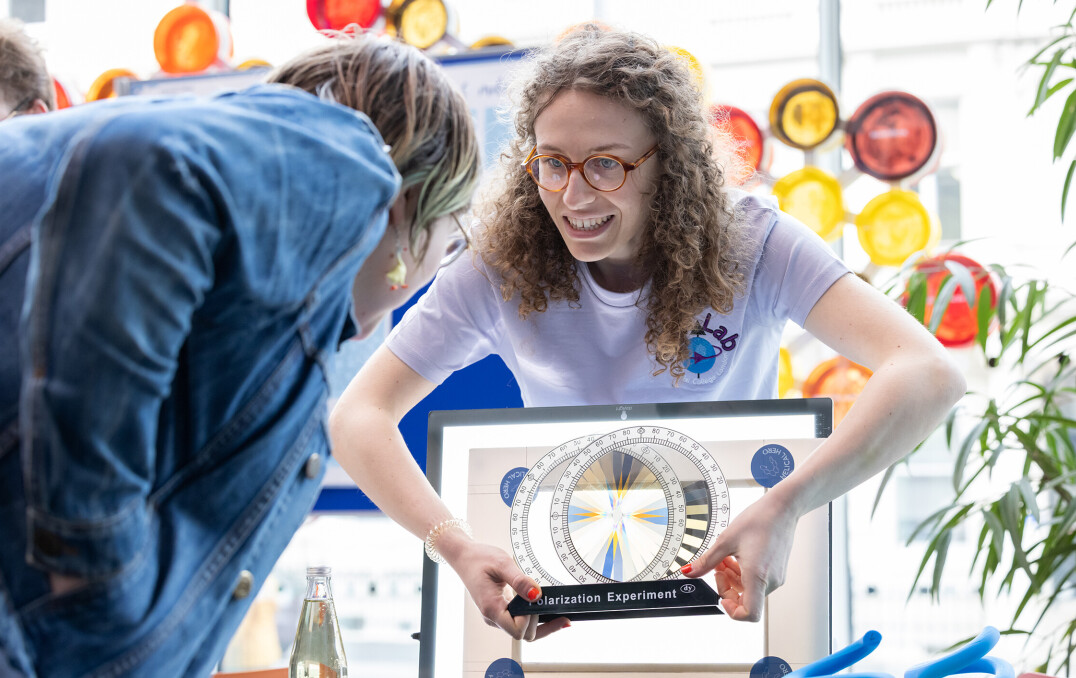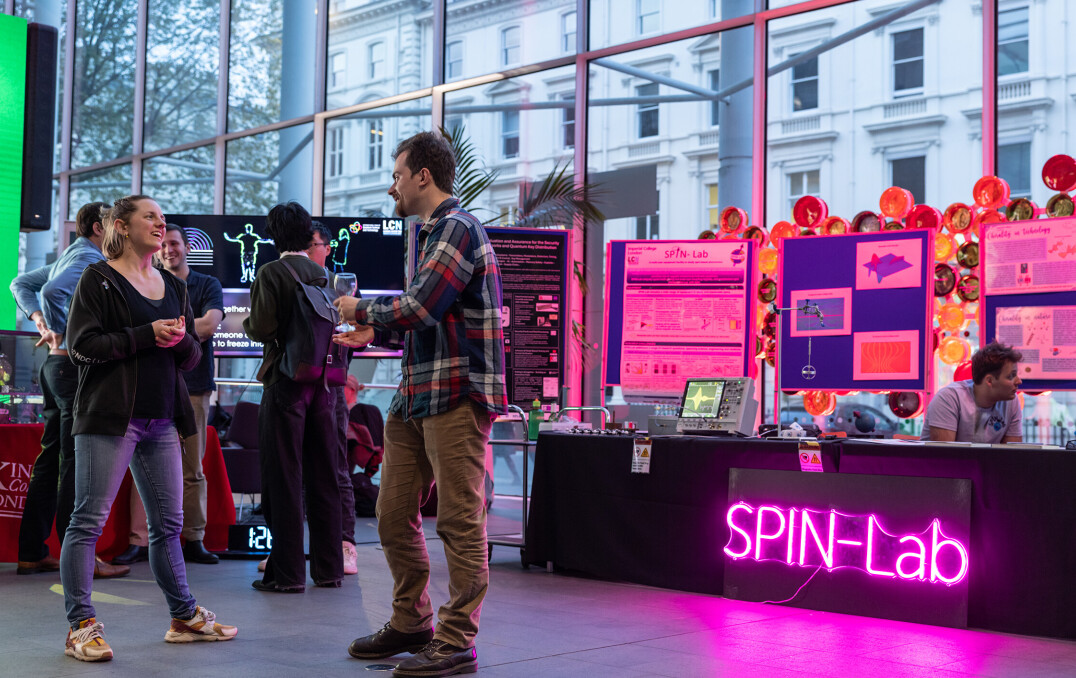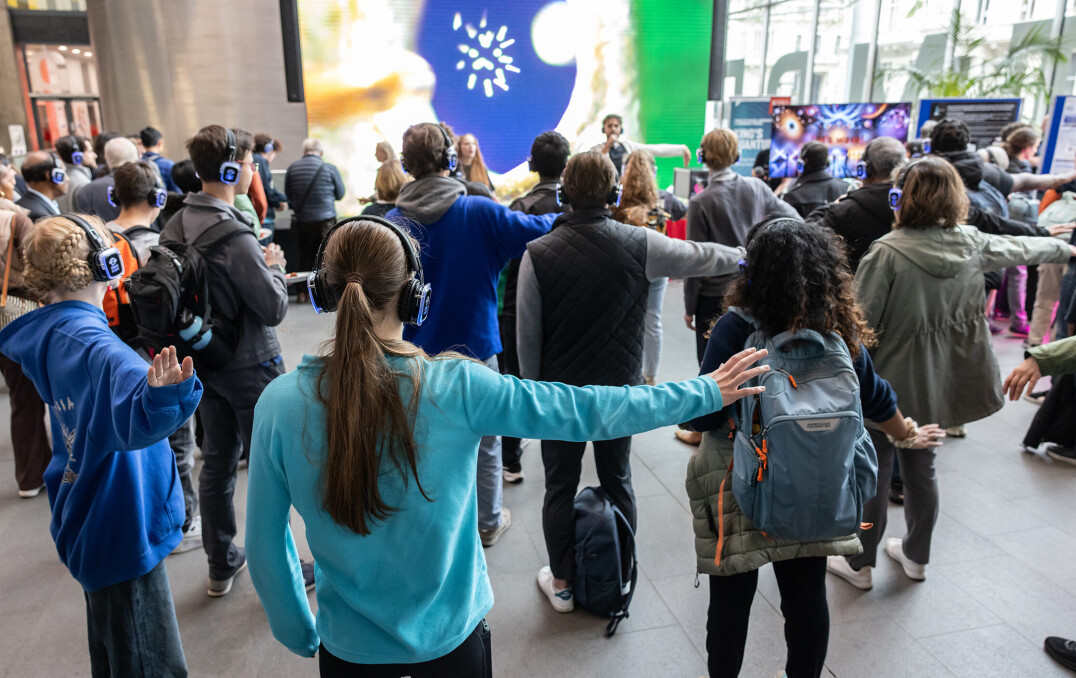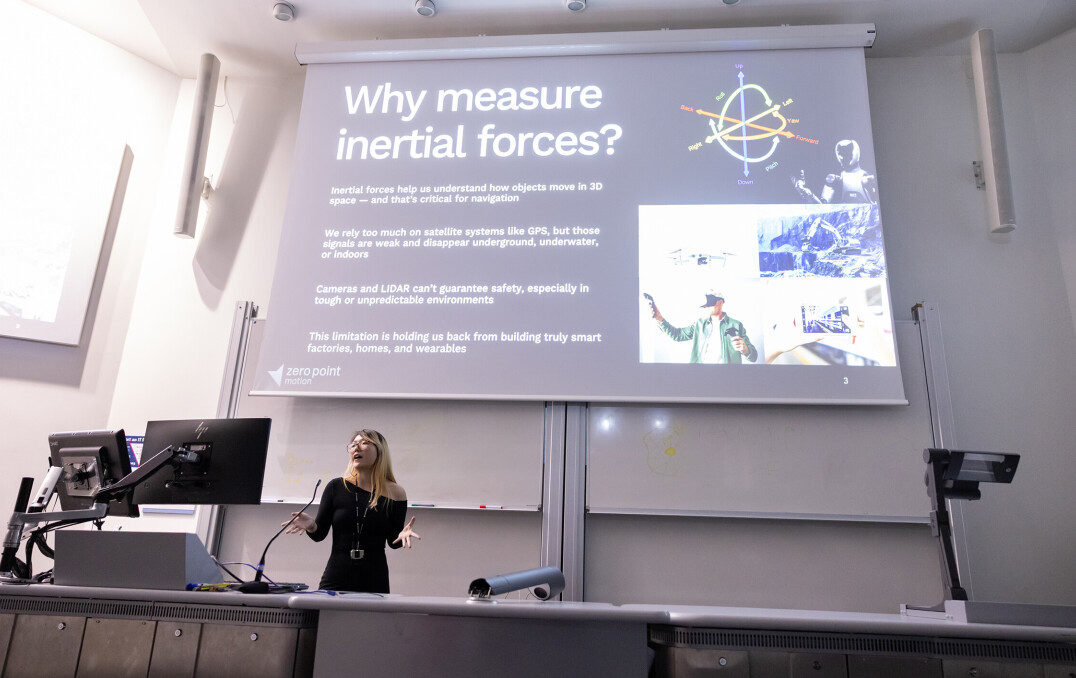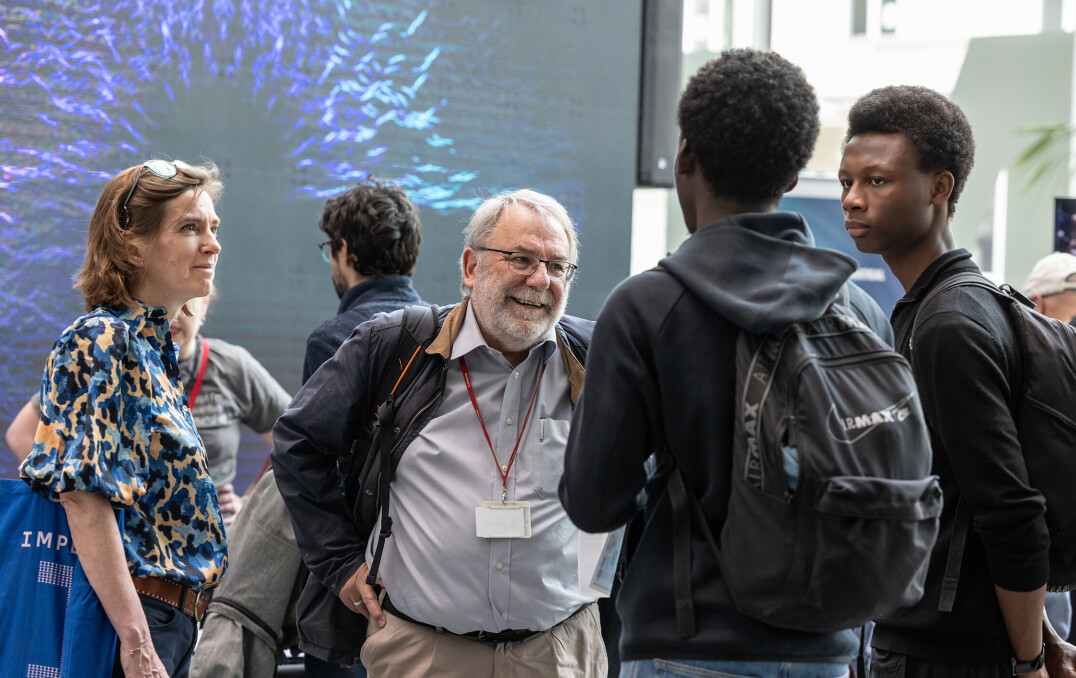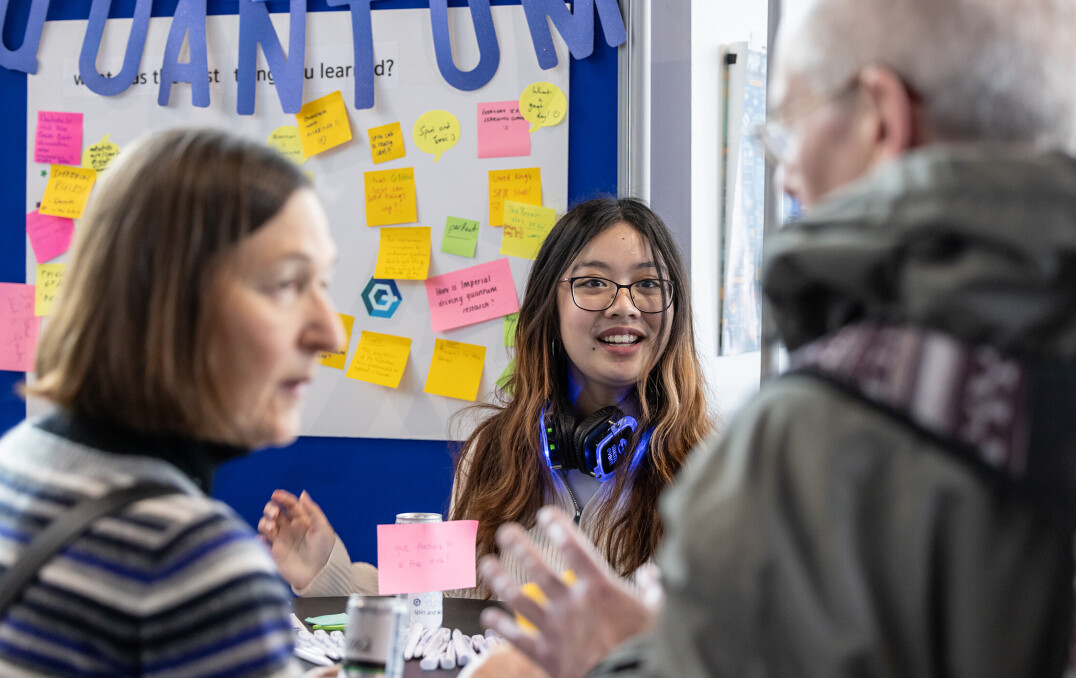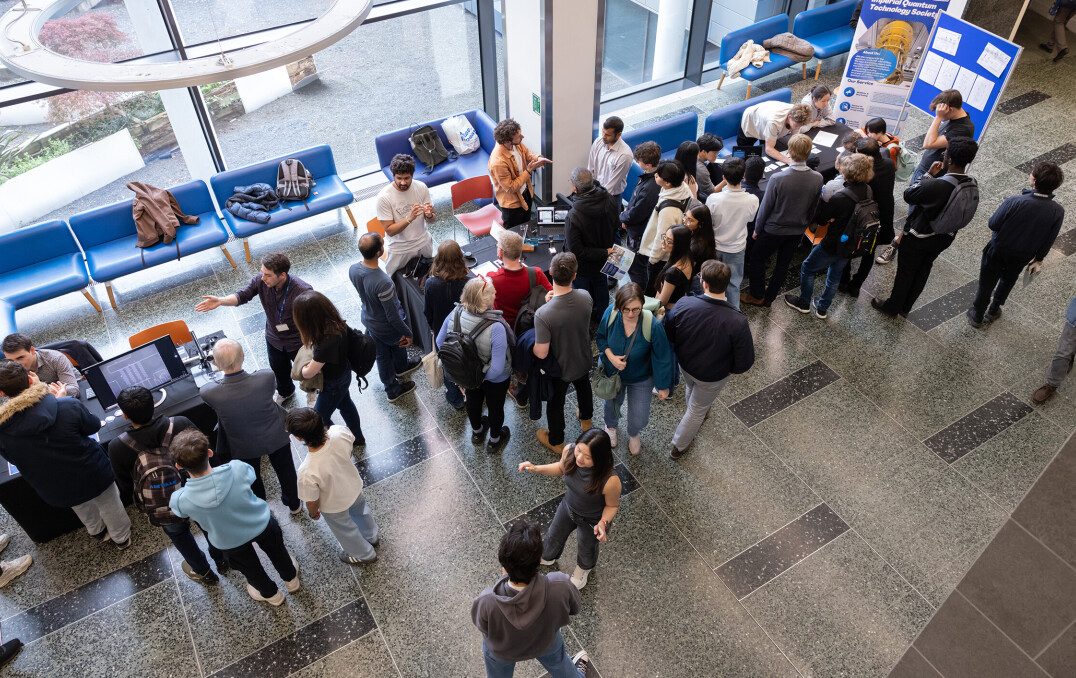Imperial brings quantum to life for World Quantum Day
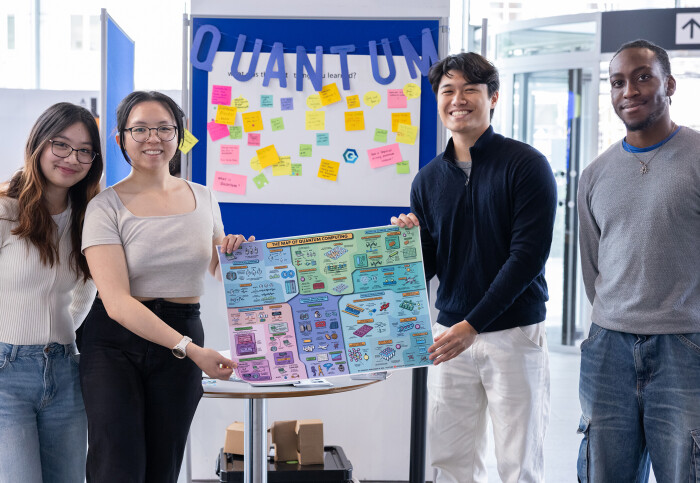
Imperial College London and the London Centre for Nanotechnology partnered to showcase the latest quantum research through public engagement.
World Quantum Day is celebrated annually on 14 April. This year also marks the International Year of Quantum, highlighting 100 years since the development of quantum mechanics.
The quantum day celebration at Imperial attracted hundreds of visitors, from children to parents to policymakers to investors, who were able to explore the latest quantum research from the Imperial Centre for Quantum Engineering, Science and Technology (QuEST) and the London Centre for Nanotechnology, a collaborative project involving Imperial, UCL, and King’s College London.
Professor Ian Walmsley, Provost of Imperial College London and Chair of Experimental Physics, commented:
"Quantum technologies are no longer confined to theory — they’re transforming industries, societies, and futures. And Imperial is proud to be at the forefront of this transformation.
Imperial's Quantum Day 2025 is more than just a celebration — it’s a live showcase of where quantum science is heading next. But the true power of Quantum Day lies in its people — the brilliant minds turning complex theory into practical impact."
How could Quantum shape the future?
Attendees enjoyed an evening of talks, live demos, poetry and quantum dancing, which showcased the breadth of quantum research at Imperial and across the London Centre for Nanotechnology. Imperial also opened the door to its quantum laboratories to give attendees a closer look at the quantum research at Imperial and the cutting-edge facilities supporting this work.
The technology showcase highlighted how quantum research is addressing real-world challenges in healthcare, communications, navigation, security, defence, and computing. Our researchers showcased developments in high-precision sensing, secure communications and quantum networks, and new materials for scalable, sustainable quantum hardware.
- The EntageCam team shared their research on quantum entanglement-enabled imaging systems that can image in the infrared with special detectors, which means it can detect the elevated DNA concentrations characteristic of cancer without complex instrumentation.
- The Quantum Science Device Facility showcased its cryo-characterisation capabilities, which can be used to understand why (and why not!) qubits work and how to optimise them for high performance. The Quantum Science Device Facility have expertise in topological systems, which underpin Microsoft's majorana qubits.
- The SPIN Lab shared its research and efforts to uncover the behaviour of electron spins in quantum materials and devices. They are building advanced instrumentation to accelerate the translation of quantum technologies out of the lab and into the real world.
- Dr Joseph Cotter's Quantum Navigation group explored the development of advanced sensors that use quantum physics to measure accelerations and rotations with high precision, aiming to create navigation technologies that don't rely on satellite signals. This approach can address the limitations of current GPS systems, which can be affected by environmental factors and signal interference.
- The Quantum Measurement Lab highlighted the mysterious and powerful role that measurement has in quantum mechanics. People behave differently when they are being watched, and quantum systems do too!
The talks covered the current state-of-the-art and the future of quantum technologies. Speakers included Imperial alum Dr Lia Li, CEO & Founder of Zero Point Motion; Dr Steve Kolthammer, Lecturer in Experimental Quantum Physics at Imperial; Dr Abbie Bray, Lecturer in Quantum Technologies at the Centre for Doctoral Training (CDT) in Quantum Computation and Quantum Communications, Dr Daisy Shearer from the National Quantum Computing Centre and Dr Ben Miller, Research Fellow at UCL and key member of the Q-BIOMED hub.
Audiences were treated to a Silent Quantum Disco, where Dr Aita taught the audience to move like a quantum object, exploring concepts like entanglement and superposition through movement. By the end of Quantum Day, the audience were translating abstract quantum phenomena onto the dancefloor.
We believe innovation thrives at the intersection of disciplines. Quantum Day is a moment to connect, reflect, and look ahead — as we continue to shape a future defined by quantum possibility. Professor Ian Walmsley Provost and Chair in Chair in Experimental Physics
The celebration showcased the unique relationship between quantum science and art, with creatives highlighting how art can provide fresh perspectives on the quantum world.
Quantum silent disco choreographer Dr Vittoria Aita, Associate Editor at Spring Nature, discussed his creative process – and how finding science communication helped him through his doctorate research. Chandrika Narayanan-Mohan, a poet who has been an artist in residence at the Institute of Physics and Science Gallery, delighted the audience with a performance of three of her poems.
These presentations inspired audience engagement, prompting questions about creativity, the similarities of the journeys of artists and scientists and the importance of blue-skies, curiosity-driven research.
Dr Jessica Wade, Lecturer in Functional Materials in the Department of Materials, co-led the organisation of Imperial's Quantum Day celebration.
She comments: "Quantum day gives us a great opportunity to show the world how exciting, collaborative and impactful Imperial's quantum community is... and how lucky we are to be embedded within London's growing quantum ecosystem.
I could not be more proud to work with such incredible students and researchers, and I loved welcoming the next generation of quantum scientists to experience the magic for themselves!
A huge thank you to everyone who attended the day and to those who helped make the event such a success — including Megan Grace-Hughes, Andrew Gomez, and Miranda Toora."
Quantum Innovation at Imperial
Imperial researchers are tackling some of the most complex quantum challenges and working to create technologies that will benefit society. The Centre for Quantum Engineering, Science and Technology (QuEST) brings together researchers and students from a wide range of disciplines to push forward discoveries in materials for quantum technologies, the quantum internet and quantum communications.
Imperial’s work also extends globally, with partnerships like the Quantum ICoNYCh initiative, a recent collaboration between QuEST, the Chicago Quantum Exchange, and New York’s rapidly growing quantum ecosystem.
Imperial alumni, like Dr Lia Li and her quantum navigation company, Zero Point Motion, are also forging new paths in quantum research. At Quantum Day, Dr Li shared insights into her entrepreneurial work on photonics and quantum sensing, discussing how she translated her undergraduate physics degree into cutting-edge research and technologies with real-world impact.
Our researchers will be back to share more about their quantum research and engage with the public at the Great Exhibition Road Festival on 7–8 June 2025. Teams will be based in the Queen’s Tower Rooms. You can now register for free tickets to the festival on the Great Exhibition Road Festival website.
Article text (excluding photos or graphics) © Imperial College London.
Photos and graphics subject to third party copyright used with permission or © Imperial College London.
Reporter
Jessica Wade
Department of Materials
Kayleigh Brewer
Department of Materials
